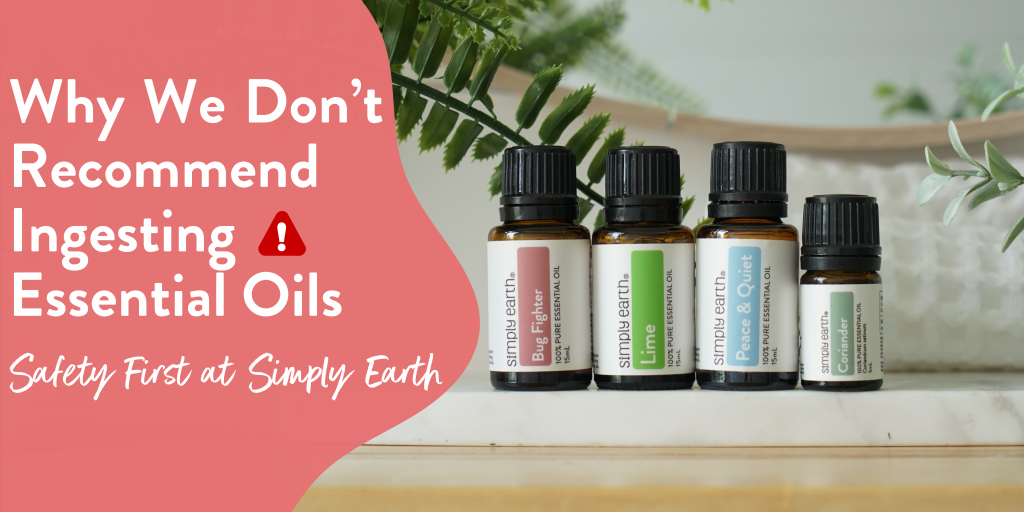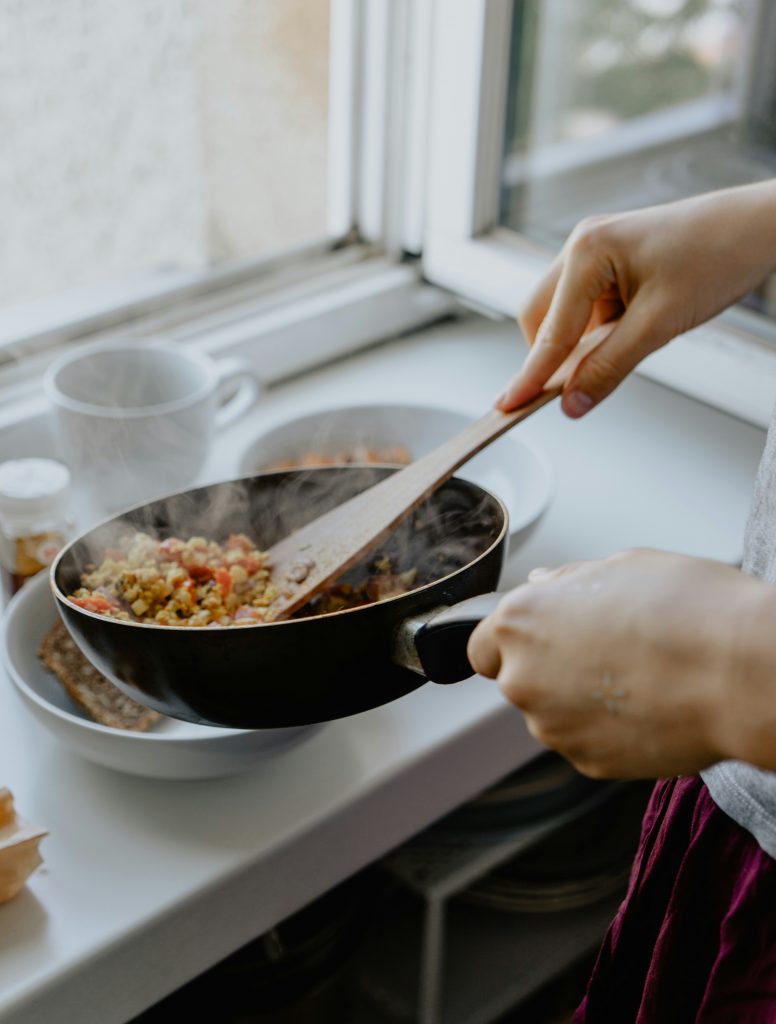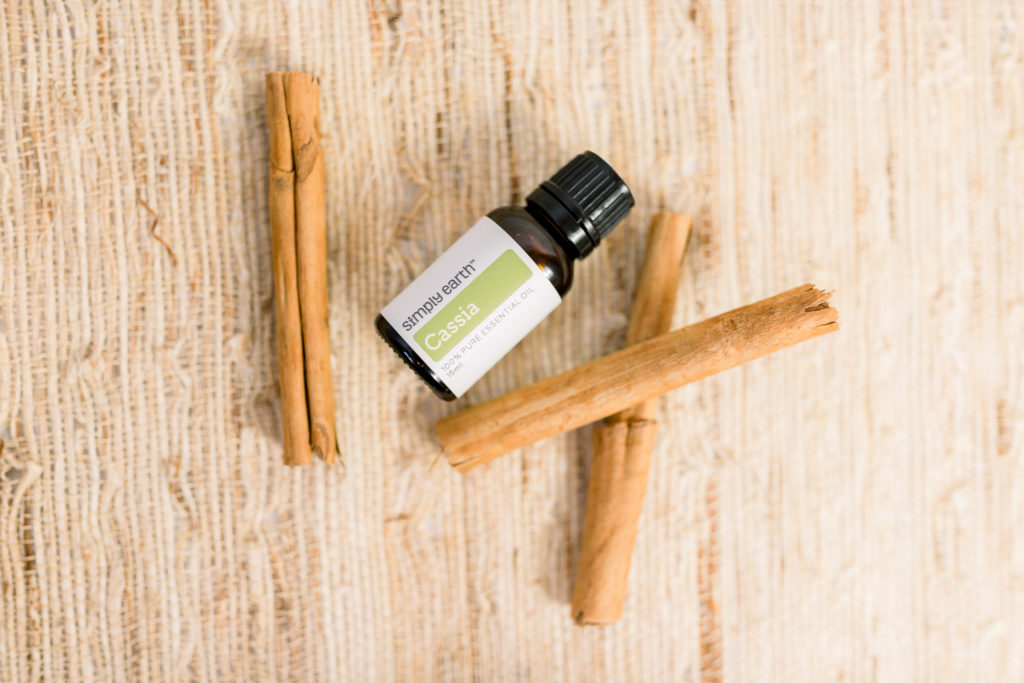
The world of essential oils is a confusing one. There are different messages on essential oil uses and benefits and whether or not they are safe for ingesting. We don’t think using essential oils should be confusing and are on a mission to change that.
So are essential oils safe for internal use? Our answer is no. We do not recommend ingesting essential oils. Here are the considerations we looked at before we made this decision as a company. You should look at these considerations too when making the choice whether or not to use essential oils for internal use.
What Is Internal Use?
First, let’s get some clarity on what internal use is.
The phrase “internal use” refers to ingesting (swallowing or eating) something.
Using essential oils for internal use means adding the oil to a drink or food and consuming it, swallowing drops of essential oils raw, or swallowing it as a capsule.
What Happens When We Ingest Essential Oils?
Let’s take it back to high school chemistry (don’t worry, this will be an easy lesson 😉). Oil repels water and loves to absorb into fat. If you try and mix oil and water, the oil will float in little blobs on top. If you put it on a fatty substance, it will quickly absorb it.
Essential oils are lipophilic, meaning they’re quickly absorbed into fatty tissues and mucous membranes—like those found in your mouth and stomach—where they can potentially cause irritation or even chemical burns when not properly diluted.
This can cause irritation and possible damage to these organs. This is supported by multiple case studies that show essential oils like eucalyptus and clove can cause mucosal irritation, vomiting, and even seizures when ingested inappropriately (Isbister et al., Journal of Paediatrics and Child Health, 2004; Tisserand & Young, Essential Oil Safety, 2nd ed.).
What About Essential Oils in Capsules or Cooking?

In this case, the first place the oils come into contact with is your stomach, causing irritation and possible damage there. Studies show that ingesting essential oils—even in capsule form—can lead to gastric distress or hepatotoxicity (Larson et al., New England Journal of Medicine, 2005). Clinical reports also caution against overuse of peppermint oil capsules due to possible esophageal reflux or allergic reactions (Journal of Clinical Gastroenterology, 2010).
While some essential oils are used in the food industry in trace amounts, the concentrations used in home kitchens are often much higher—and without proper dilution or emulsification, this can pose serious health risks. Essential oils are also likely to be more expensive than the ingredient you are substituting it with.
What about the “Generally Regarded As Safe” status?
The FDA lists some essential oils as Generally Recognized as Safe (GRAS). However, this designation does not mean they are safe to consume in the ways typically seen in home use.
GRAS status is based on extremely small quantities—measured in parts per million (ppm). For example, 1 ppm is equivalent to 1 milligram per liter of liquid. To visualize this, think of one grain of sugar among 273 sugar cubes—that’s about 1 ppm.
One common way people ingest essential oils is by adding them to their water. But to follow FDA guidelines, you’d need to fill a 60-gallon tub with water, add 7 drops of essential oil, and include an emulsifier to safely disperse the oil. Not exactly a practical way to flavor your drink!
Even though some essential oils have GRAS status, this applies to trace amounts in commercial food production—where emulsifiers and rigorous safety standards are used. At home, dropping oils into your water leaves them floating undiluted, where they can stick to your lips, throat, or stomach lining and cause irritation.
In fact, research shows that ingesting essential oils without proper emulsification can lead to direct contact with mucous membranes, increasing the risk of chemical burns or sensitization (Toxicon, 2017). Even culinary favorites like lemon and oregano oil have been linked to toxic effects in high concentrations (Posadzki et al., British Journal of General Practice, 2013).
In short, GRAS status means essential oils may be safe in very small, well-regulated doses within commercial food—not as casual supplements or drink additives at home.
Simply Earth Essential Oils Are Pure

Some essential oil users would argue that if a company doesn’t recommend ingesting their oils, they are not pure.
Our recommendation of not ingesting essential oils is based on safety.
Simply Earth Essential Oils are pure, and they are backed by our Simply Pure Promise. All of our essential oils are produced where they are best grown. We bottle them personally in our Simply Earth facility to ensure quality. All of our oils are GC/MS tested (a test which measures all of the chemicals in essential oil, so we can be sure that it is pure). You can find the GC/MS test results on our product pages.
You Don’t Need to Ingest Essential Oils
Essential oils are highly concentrated natural substances. They are helpful in supporting your body’s wellness. The benefits you want for your body using essential oils are likely achievable by using essential oils diluted, topically on the skin, or through aromatherapy.
Ingesting essential oils, instead of topical application on the skin or through aromatherapy, is more likely to cause irritation and possible damage. It’s not worth ingesting them when you can get their natural benefits through a safer route.
Other Considerations When Ingesting Essential Oils
Essential oils that are ingested are more likely to interact and cause adverse effects for those taking medications.
Some essential oils are poisonous if swallowed—and some can even be fatal when ingested by pets or young children. The American Association of Poison Control Centers reports hundreds of pediatric exposures each year related to essential oil ingestion. Oils like wintergreen, eucalyptus, and pennyroyal have been associated with serious outcomes including liver failure, seizures, and death (Clinical Toxicology, 2019).
While some people assume ingestion is only dangerous with rare oils like pennyroyal (which has caused liver failure in several documented cases), it’s important to note that commonly used oils—like eucalyptus, clove, tea tree, and wintergreen—have also been linked to poisoning and severe reactions, especially in children.
Essential oils are highly concentrated and vary in safety based on dosage, dilution, and individual sensitivity. Even oils that seem “mild” can cause harm when used internally without proper training and supervision.
Is There an Exception for Ingesting Essential Oil?
The only situation in which we can see where ingesting essential oils may be valuable is when dealing with severe health issues under the supervision of a medical doctor who is versed in pharmaceutics and who is an experienced aromatherapist.
Indeed, enteric-coated peppermint oil is used in clinical settings to manage IBS symptoms. But these studies are based on standardized pharmaceutical preparations, not general essential oils (Cash et al., Digestive Diseases and Sciences, 2016). The dosage and delivery method are tightly controlled, which is not possible in home DIY use.
We Care About Your Safety

As a company, we do not recommend the casual ingesting of essential oils. It can cause irritation and possible damage to your organs. Please do not ingest essential oils unless under the supervision of a medical doctor who is versed in pharmaceutics and who is an experienced aromatherapist.
If you want to know more about our oils, check out our Essential Oil Recipe Box! Each month, you can receive four full-size 100% pure essential oils, six natural recipes, plus the ingredients you need to make them in our Recipe Box.
With the box, you’ll learn new ways to use essential oils, make more essential oil roll-on recipes, and have the peace of mind that you are making your home toxin-free. This month of April, we focus on Home Detox. This box is worth over $150 if priced from the Big Essential Oil Companies. You get all those goodies from Simply Earth for only $44.99. Go get it!
Trusted Scientific Sources
- Isbister GK et al. (2004). Pediatric poisoning with eucalyptus oil. J Paediatr Child Health.
- Larson AM et al. (2005). Hepatotoxicity associated with ingestion of pennyroyal oil. NEJM.
- Posadzki P et al. (2013). Adverse events of aromatherapy: A systematic review. Br J Gen Pract.
- Tisserand R, Young R. (2014). Essential Oil Safety, 2nd Edition.
- American Association of Poison Control Centers Annual Reports
- Cash BD et al. (2016). Peppermint oil for IBS: A randomized clinical trial. Dig Dis Sci.

